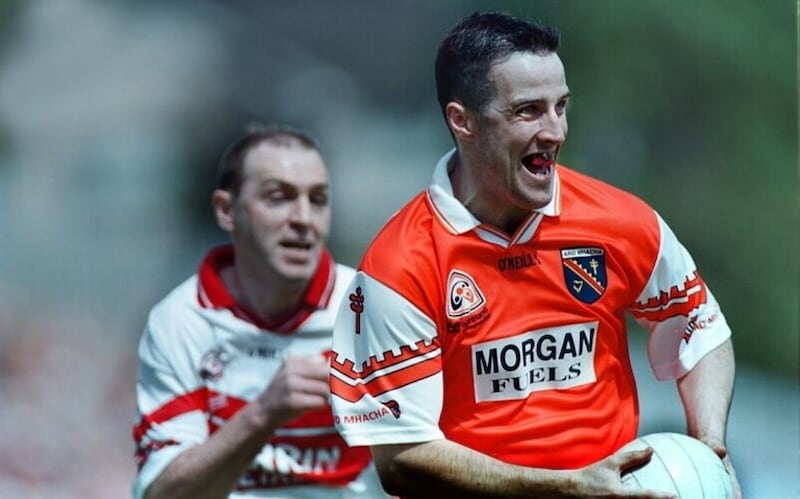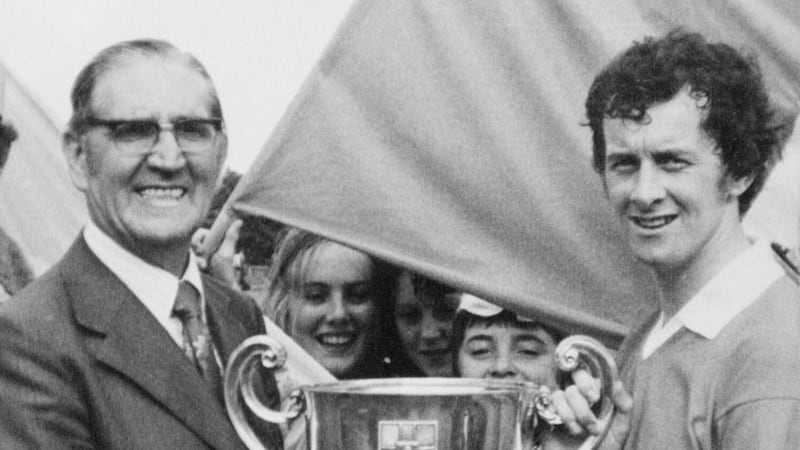JIMMY Smyth has planned to get out on his bike and after that he’s helping his grandson with some GCSE revision so we haven’t got much time to chat.
What time we do have is well spent.
Winding the clock back almost 50 years to a double-header between Armagh and Derry, a window in time which encapsulates why the Ulster Championship has always been box office viewing.
Derry won the first game (1976) easily on the way to their only ever provincial two in-a-row, a feat they can repeat on Sunday, but Armagh had their vengeance the following year.
We begin with that 1976 meeting; an Ulster quarter-final in Omagh.
“It was something like 1-20 to 2-1, wasn’t it?” asks Jimmy.
It wasn't quite as bad as that - the final score was 1-19 to 2-1 - but it was a tanking nonetheless. The late Sean ‘Dingle’ Daly was Armagh’s only scorer on a day when nine Derry players raised flags. Brendan Kelly hit seven points, Adrian McGuckin got 1-2, Tom McGuinness and Gerry McElhinney got a couple each…
Looking at the result all these years later, you assume that Armagh were way out of their depth but Jimmy recalls how the Orchardmen – managed by former Derry player Gerry O’Neill (brother of former Celtic manager Martin) – had prepared for the game in high spirits.
“We won Division Three that year,” he explains.
“We beat Donegal at the Athletic Grounds and then qualified to play Clare at Croke Park. We drew the first match thanks to a late point by Denis Stevenson and we beat them in the replay (Croke Park again) by a point.
“The following week we played Cork (National League semi-final) so Armagh were in Croke Park three Sundays in-a-row in ’76 which was a big deal at the time and we went into the Championship that year in good-enough nick.”
Armagh beat Fermanagh in the preliminary round by a point and, even though Derry had beaten them in 1975, they trained for their quarter-final against the Oak Leafers fancying their chances.
“That was a good Derry team,” says Jimmy.
“It was a sweltering-hot day and I’m not saying the heat affected us, but it didn’t affect them anyway. They were well established and I suppose it showed the gulf between our National League title and the Ulster Championship and reality kicked on because it showed us exactly where we were. Believe it or not, it set us up well for the following year.”
WITHOUT a backdoor or second tier competition to fall back on, the Armagh players went their separate ways after that 15-point defeat. They regrouped for the National League and their form was decent but there was no indication that a ground-breaking Championship campaign was on the cards for the Orchard county.
Inside the camp it was a different story and there was fame and fortune to come.
“Big Colm (McKinstry), God rest him, said to me at the start of the Championship: ‘I see Armagh’s 16 to 1 to win Ulster’,” Jimmy recalls.
“I says: ‘You’re joking’. So we both put a pound on us.
“We beat Cavan thanks to a late goal from Colm and then we played Monaghan in the semi-final.
“Years later I discovered that a young man made his debut that day playing against me at centre half-back – his name was ‘Nudie’ (Eugene) Hughes.”
Hughes would of course go on to great things with Monaghan but it was a baptism of fire for him and he was moved off playmaker Smyth and pushed forward. Tom McCreesh picked him up and restricted him to a point.
Corner-forward Eamon O’Neill scored two goals as Armagh forced their way into a first Ulster Championship final since 1961.
Meanwhile, on the other side of the draw, three in-a-row chasing Derry saw off Tyrone and Down to book their spot in the Clones decider and after the hammering they’d given Armagh the previous year, the pundits agreed that there could only be one winner in the final.
The Sunday before the decider, journalist Tony McGee invited Jimmy and Derry’s Anthony McGurk to Belfast to record a preview of the game. He asked both captains how they thought the final would pan out and, when the formal interview was over, Anthony left the room to go to the toilet.
With the microphone turned off, Jimmy was a little more candid…
“Tony turned to me and says: ‘Now that he’s away, tell me: How do you think you’ll do?’” says Jimmy.
“I says: ‘We’ll beat them’.
“To come out with that sort of a line after the two previous results was looked upon as being slightly nuts!”
Derry were also very confident and – given their dominance – they had reason to be but perhaps they made the cardinal error of looking too far ahead.
“Frankie Kearney was the manager and Sean Bradley (former Derry chairman) was helping him,” Jimmy explains.
“Before the Ulster final they headed off to watch the Connacht final (the winners of Ulster played the winners of Connacht in the All-Ireland semi-final) and were looked after brilliantly by Mick Loftus, who sadly passed away last week.
“So they had all the information they needed on Roscommon for the All-Ireland semi-final and then we ruined it on them!”
And there was another massive Derry mistake. Brendan Kelly, the top scorer from the 1976 meeting, and Mickey Moran, a future Derry and Mayo manager whose recent achievements include managing Kilcoo to the All-Ireland club title, had both gone to the USA but were prepared to return for the Ulster final.
“The Derry management were looking to bring them home but the Derry County Board told them: ‘You can bring them back for the (All-Ireland) semi-final,” says Jimmy.
“The best laid plans of mice and men…”

YEARS later, after Joe Kernan had featured on TG4’s Laochra Gael series, Jimmy managed to get a recording of the ’77 final. Only then did he realise that Armagh could have been blown away in the opening stages.
“I always had memories in my head of that final, I always thought we were in control of that match but, when I watched it back, we weren’t,” he says.
“Derry started like a house on fire and ran riot but they couldn’t score. I remember Gerry McElhinney raced through a couple of times – he was very distinctive, he was tall and he had a bandana round his head and he was a great footballer – but he had left his shooting boots at home. Despite all their possession he and Derry kicked a lot of wides, they didn’t take advantage of their superiority at all.”
Derry paid for their wastefulness. Armagh found their feet and Larry Kearins, ‘Paddy Mo’ (Paddy Moriarty) and Noel Marley scored the goals in a 3-10 to 1-5 win – a 26-point swing from the meeting a year previously.
“I remember going through and the ball sat up for me and I kicked it into Larry and he took it in his left hand, took a wee toe-tap and just, bang, past John Summers,” Jimmy recalls.
“I knew that was the match over.
“We were very confident and that was down to Gerry O’Neill, he had us convinced that we would do well and there was no reason we couldn’t beat them and that’s exactly the way it turned out. We took our chances – big Colm was in terrific form in the middle of the field, Joe Kernan as well and that was it.”
Afterwards there was no climbing the steps of the stand to receive the Anglo-Celt Cup in front of the joyous mass in orange and white, no acceptance speech… It was no less celebrated but much more low-key back then and the Armagh skipper was presented with the cup in the middle of the field by Con Short, president of the Ulster Council.
Armagh went on to beat Roscommon and reached their first ever All-Ireland final. The decider against Dublin didn’t go their way but the ripple effect of the achievements of the teams of that era, which included further Ulster titles in 1980 and ’82, and the impact of the characters they produced are still felt in Armagh GAA.
“That period produced people who put something back into Armagh,” says Jimmy.
“Brian McAlinden, Joe Kernan and Paddy Mo – all Armagh managers – came out of that team and then Brian Canavan and Jim McCorry, who played in the 1980 team, were both county managers and you had all the boys who went on to be managers or chairmen of their clubs and went on to county board and national level. Their impact on Armagh and the GAA was huge.”
Of course Jimmy himself played a huge role in bringing the GAA onto the mainstream stage north of the border as an astute commentator on BBC. He called the game at the 2000 final when Armagh, spearheaded by Barry O’Hagan, son of his 1977 teammate Noel, beat Derry in the Anglo-Celt showpiece.
“I remember I was interviewed before that game and I said: ‘My head says ‘Derry’ and my heart says ‘Armagh’ and I’m thinking something similar for Sunday.
“There are a lot of similarities to ’77. Derry were Ulster champions then and we came along and, while a lot of people didn’t give us a chance, we thought we could win.
“If you have that and a plan and a wee bit of luck anything can happen.”
You know what Derry fans would say to that?
On yer bike Jimmy…







